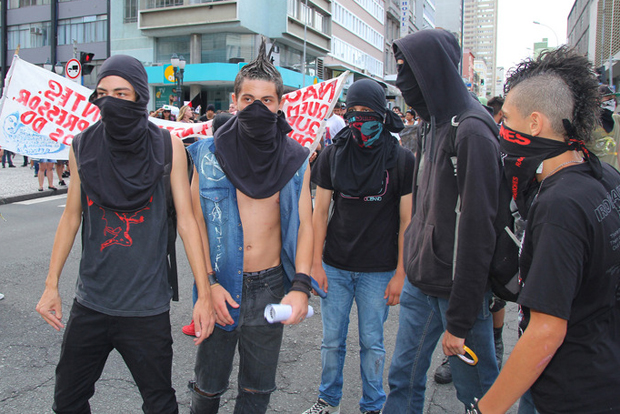Index relies entirely on the support of donors and readers to do its work.
Help us keep amplifying censored voices today.

In Curitiba, about 300 protesters took to the streets of the central city asking for more health and safety improvements in the country and against the hosting of the World Cup 2014 in Brazil. (Image: João Frigério / Demotix)
Brazilians shouldn’t protest during the World Cup, according to UEFA President Michel Platini.
Speaking to reporters, the French former footballer who is now head of European football’s governing body, said that: “We must tell the Brazilians that they have the World Cup and they are there to show the beauty of their country and their passion for football. If they can wait at least a month before making social outbursts, it would be good for Brazil and for the football world.”
Brazilians should “pay tribute to this beautiful World Cup,” Platini continued, saying it was given to Brazil to “make them happy”.
He added that Brazilians should get in the mood for receiving tourists from all over the world “and that for one month, they should make a truce”.
The men running football (it is most often men) have a history of making at best misguided, at worst ignorant, statements about complicated issues — FIFA President Sepp Blatter famously suggested racist incidents on the pitch could be settled by a handshake.
However, you would think that the size of last summer’s World Cup-related protests, and the fact that demonstrations are still going on almost a year later, would make even the grandees of world football understand that Brazilians have legitimate grievances — and that these shouldn’t be shoved aside just so we can have a global party.
The various controversies surrounding Brazil 2014, from the price tag of some £7 billion, to lack of transparency and unsafe working conditions at building sites, have been well documented. This is in no small part due Brazilians taking to the streets, making it impossible for their government, FIFA and the rest of the world to ignore their dissatisfaction.
But Platini isn’t the only one who wants protesters to take a break during the very event that for many has been the focus of their anger. Indeed, authorities have taken a number of steps aimed at suppressing demonstrations, including banning people from wearing masks during protests and “promoting ‘tumult’ within 5 km of a sporting event.” The over 170,000 security personnel set to be deployed will probably play their part too.
Whether or not you believe that the intention behind awarding Brazil the World Cup was to make people happy, there’s no escaping that fact that many aren’t. The competition is going ahead, there’s no changing that, but Brazilians should have the right to show their unhappiness about it whenever they like.
This article was published on April 30, 2014 at indexoncensorship.org
Just hours before England secured a place in the Euro 2012 quarter finals, sports enthusiasts and free expression advocates gathered at the Free Word Centre on Tuesday, discussing whether human rights has any place in the world of major sporting events, from Bahrain’s Grand Prix to the Olympics.
On the panel was award-winning sports journalist and author Mihir Bose, Chairman of the Professional Footballers’ Association Clarke Carlisle and historian Martin Polley.
The evening began with a discussion of Euro 2012 amid reports that racism is rampant among the host countries’ football culture.
Northampton Town footballer Clarke Carlisle said that, with Euro 2012, Uefa failed in its duty of care to minority players and supporters. He was a great believer of football’s power to get messages across, he said, but it was important to understand the realities of the situation, including that football, along with most other sports, had been corrupted by money. Most players have other priorities: when asked whether players would notice the absence of UK government ministers’ (a protest at Ukraine’s human rights record), Carlisle answered: “Not one iota.”
Uefa, the International Olympic Committee and other sporting bodies have become big businesses. They view racism as society’s problem, not something they have to deal with, said Mihir Bose. “Are these organisations fit for purpose?” he asked. If sport wants to operate as a big business, it must adhere to the rules of corporate governance that other companies must accept.
Martin Polley railed against what he referred to as the “psuedo-religion” of the Olympics, where governments, sporting body officials and others celebrate the so-called “good” implicit in the Games, the idea that the Olympics can somehow benefit society. Reminding the audience how sport can be used to support political aims, he pointed to the 1936 Berlin Games, where, after a brief attempt to bring the “bourgeois” event to an end, the Nazi party took full advantage of the propaganda opportunities at its disposal.
The panellists reflected on the ways corporate sponsors will dominate the London landscape during the Olympics, mocking Coca-Cola’s “pouring rights”, the prospect that an individual could be fined for wearing clothing featuring logos outside the Olympic “family” of sponsors and the London 2012 bidders’ promise of a “clean city”, free of any billboard featuring a non-Olympic sponsor.
With the legacy of the Olympics looming in Londoners’ minds, the acknowledgment that racism was still prevalent in British football and the bleak picture of East London trampled over by the Olympic’s organising committee (Locog) as described by the Counter Olympic Group, members of which were in the audience, there were more than a few reasons to be a little gloomy. But with such informed and fascinating panelists and fantastic audience engagement, there was also a feeling that there was a lot more to do and a lot more to learn.
And then England won 1-0.
Please register here to receive invitations to future magazine launches.
Click on The Sports Issue for subscription options and more.